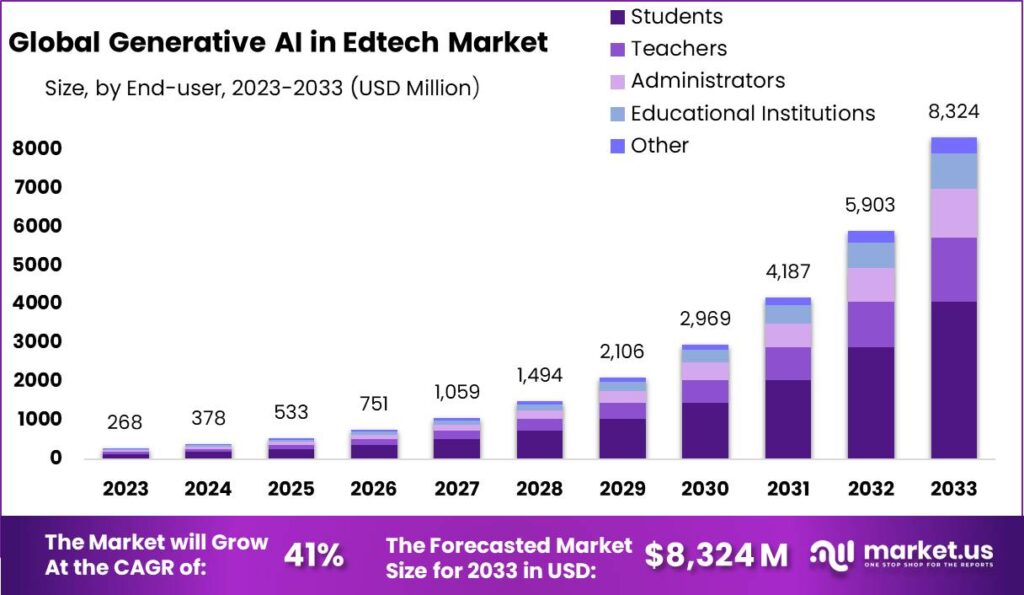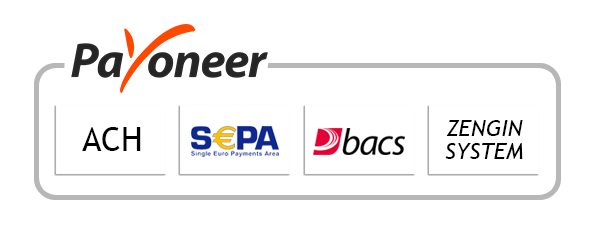Generative AI is increasingly becoming a vital part of the education technology (EdTech) landscape, offering transformative potential across various aspects of learning and administration. In 2023, the sector witnessed the rapid adoption of generative AI tools, including but not limited to virtual tutors, AI-driven content creation, and personalized learning experiences. Innovation is key to growth in the Edtech market, and these top Generative AI in Edtech companies, with their groundbreaking solutions, are poised to lead the way mentioned below are undoubtedly pioneering to stay ahead in the race.
Generative AI In Edtech Market Analysis
The Generative AI in EdTech market is experiencing robust growth, driven by the increasing demand for personalized learning experiences, the need for efficient content generation, and the continuous search for tools that can enhance teaching effectiveness and student engagement. Tools such as virtual tutors, AI-powered content creation platforms, and personalized learning pathways are gaining traction. Consequently, The global Generative AI in Edtech market is estimated to reach a substantial value of approximately USD 8,324 million by 2033, demonstrating a robust Compound Annual Growth Rate (CAGR) of 41% during the forecast period.

Source: Market.us
Top 7 Generative AI in Edtech Companies
In the rapidly evolving Generative AI in EdTech market, several key players are leading the way with innovative solutions and platforms that are transforming the landscape of education technology. These market leaders are leveraging Generative AI to offer personalized learning experiences, interactive content creation, and assessment tools that cater to a wide range of educational needs.
1. Microsoft Corporation
Microsoft, a global technology giant, has been at the forefront of integrating AI into its educational products and services. With its Azure AI platform, Microsoft offers a suite of AI tools and services that empower educators and developers to create personalized and interactive educational experiences. Microsoft also provides AI-driven insights and analytics to improve learning outcomes and student engagement.
2. Google LLC
Google, another leading force in the technology sector, harnesses AI through various initiatives and products aimed at the educational sector. Google’s AI-powered tools, such as Google Classroom and the AI-driven features within G Suite for Education, facilitate collaborative learning environments, automate administrative tasks, and offer adaptive learning experiences.
3. Cognii Inc.
Cognii is a specialized provider of AI-based educational technologies, focusing on natural language processing (NLP) to deliver personalized tutoring and assessment solutions. Cognii’s Virtual Learning Assistant uses AI to engage students in adaptive conversations, providing instant feedback and assessments that enhance the learning process.
4. Knewton
Knewton, now part of Wiley, was known for its adaptive learning technology that personalizes educational content and assessments based on individual student performance. Although Knewton Alta is the flagship adaptive learning product, its commitment to using AI to tailor learning experiences remains influential in the EdTech space.
5. Blackboard
Blackboard is a leading provider of learning management systems (LMS) and virtual learning environments (VLEs) for educational institutions and businesses. The company has been incorporating AI and analytics into its platforms to enhance the educational experience by offering personalized learning paths and insights into student performance.
6. Metacog Inc.
Metacog offers advanced analytics and assessment solutions that enable the development of competency-based learning products. Utilizing AI and machine learning, Metacog’s platform provides real-time assessment data and insights, allowing educators to tailor instruction to meet the specific needs of each student.
7. Duolingo
Duolingo is a popular language-learning platform that uses AI to offer personalized lessons and adaptive learning experiences. Its AI algorithms assess user performance and adapt lessons accordingly, making language learning more effective and engaging for users of all levels.
Suggested Readings: Generative AI In Edtech Facts and “Latest” Statistics
Challenges and Considerations
Despite its potential, the adoption of Generative AI in EdTech comes with its set of challenges. Ethical considerations, including data privacy, content accuracy, and the potential for misuse, remain top concerns. Additionally, there’s an ongoing debate regarding the impact of AI on the role of teachers and the potential for it to reduce human interaction in education.
Market analysts also note the necessity for robust governance frameworks and ethical guidelines to ensure the responsible use of AI in educational settings. Furthermore, there’s a call for more research into the long-term impacts of Generative AI on learning outcomes and student well-being
Future Outlook
The convergence of Generative AI, augmented reality, adaptive learning, and data analytics is poised to reshape the future of education, offering personalized, interactive, and data-driven learning experiences. As EdTech continues to evolve, strategic investments in Generative AI research and development, collaboration between academia and industry stakeholders, and proactive measures to address ethical and regulatory challenges will be pivotal in shaping a sustainable and inclusive digital learning ecosystem.
Conclusion
Generative AI holds immense potential to transform the EdTech landscape by revolutionizing content creation, personalized learning, and educational accessibility. Despite the challenges, the strategic integration of Generative AI technologies in educational settings promises to unlock new opportunities for innovation, collaboration, and lifelong learning in the digital age.



